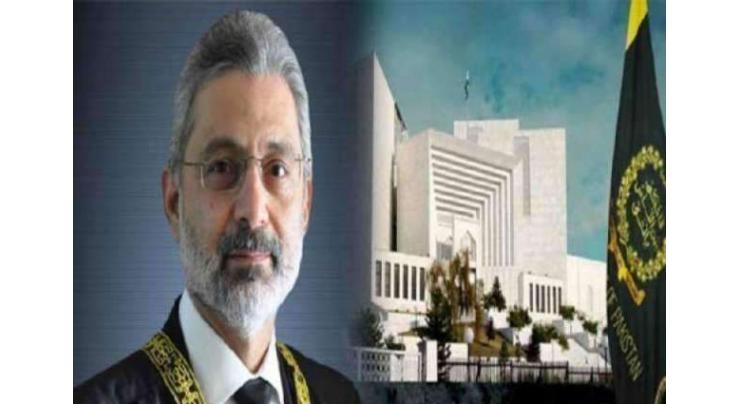
Supreme Court Adjourns Justice Qazi Faez Isa's Petition Till Wednesday
Fahad Shabbir (@FahadShabbir) Published January 28, 2020 | 11:09 PM

The Supreme Court on Tuesday adjourned hearing of Justice Qazi Faez Isa's petition challenging the presidential reference filed against him over alleged non-disclosure of assets in his wealth statement till Wednesday
ISLAMABAD, (UrduPoint / Pakistan Point News - 28th Jan, 2020 ) :The Supreme Court on Tuesday adjourned hearing of Justice Qazi Faez Isa's petition challenging the presidential reference filed against him over alleged non-disclosure of assets in his wealth statement till Wednesday.
A 10-member larger SC bench headed by Justice Umar Ata Bandial and comprising Justice Maqbool Baqar, Justice Manzoor Ahmad Malik, Justice Faisal Arab, Justice Mazhar Alam Khan Miankhel, Justice Sajjad Ali Shah, Justice Syed Mansoor Ali Shah, Justice Munib Akhtar, Justice Yahya Afridi and Justice Qazi Muhammad Amin Ahmed heard the case regarding proceedings of the Supreme Judicial Council (SJC) against Justice Qazi Faez Isa.
The reference filed against Justice Qazi Faez Isa alleged that he acquired three properties in London on lease in the name of his wife and children between 2011 and 2015, but did not disclose them in wealth returns.
During the course of proceedings, Rasheed A Rizvi, counsel for the Sindh High Court Bar Association, said the independence of judiciary depended on the term of a judge. If the term of the judge was not secured, he or she would not be able to perform, he added.
He said the removal of judges was the most difficult process around the world, while in Pakistan it was very easy to remove them.
Justice Umar Ata Bandial asked the counsel whether he was criticizing the Constitution. The procedure for dismissing the judges was clear in the Constitution and in the present case, the Supreme Judicial Council was acting according to the law, he added.
He asked the counsel to argue his case instead of criticizing the system. A judge lived in a house of glass and was also accountable, he added.
Rasheed Rizvi said Article 209 gave protection to the judges.
Justice Mansoor Ali Shah observed that every person, including the judge, was not beyond accountability. Action against a judge must be in accordance with the Constitution and the law, he added.
Rasheed Rizvi said there were only two shooters on the house of glass, one was the president and the other was the Supreme Judicial Council. The summary of the reference was based on spy accounts, he claimed.
He alleged that Justice K K Agha, who had passed the judgment on May 12, 2007 incident, was also targeted in the reference. Wasim Akhtar admitted in the court that roads were blocked in Karachi on May 12 following his instructions, he claimed.
The counsel said he saw the judges jumping the court walls and entering the Sindh High Court's building on that day.
Justice Bandial asked what happened to the Constitution on November 3, 2007.
Rasheed Rizvi responded that the same thing happened on November 3, 2007 which was happened on May 12, 2007.
Advocate Salman Akram Raja, counsel for the Pakistan Bar Council, said the Asset Recovery Unit obtained the material against the judge in violation of the protection guaranteed to him.
He said the Asset Recovery Unit was not authorized to conduct such an inquiry under the Federal Government Rules. The ARU could not collect material without the president's permission and it should have also kept the information in front of the president at the outset, he added.
Salman Akram Raja said the parliament must legislate on the matter as otherwise the default procedure would have to be adopted.
Justice Munib Akhtar said there was no relation between the misconduct of judges and the tax authority.
Justice Munib Akhtar said if the complaint was not heard then the complainant could say that his rights were infringed upon.
Salman Akram Raja said the judge had rights like that of a common citizen. It was a matter of dignity of the judiciary.
Justice Bandial said it was not a matter of tax, but of misconduct, and the Supreme Judicial Council was reviewing only sources of income.
Related Topics
Recent Stories

Delegation of international investors meets Finance Minister

Federal Govt stands with Balochistan for its development: Naqvi

UAE President receives condolences of Prime Minister of Pakistan over passing of ..

ECC approves to enhance wheat procurement targets

UN urges Israel to 'stop escalation' as tanks enter Gaza's Rafah city

EU stumps up $125 mn for Yemen after aid groups' plea

Governor Tessori condemns May 9 riots, calls it a 'pre-planned conspiracy'

PM condoles with UAE President over Sheikh Tahnoun’s death

Milan nets Giro 4th stage, Pogacar retains lead

UBS back in profit after Credit Suisse takeover losses

Asiya Gul lauds Shafaat's services as DG LG

President for dialogue with all political forces in Balochistan
More Stories From Pakistan
-
Mohsin Naqvi pays surprise visit to NADRA center
2 hours ago -
May 9 vandalism against state of Pakistan: Muqam
3 hours ago -

Federal Govt stands with Balochistan for its development: Naqvi
3 hours ago -

Governor Tessori condemns May 9 riots, calls it a 'pre-planned conspiracy'
3 hours ago -

PM condoles with UAE President over Sheikh Tahnoun’s death
3 hours ago -

Asiya Gul lauds Shafaat's services as DG LG
3 hours ago
-

President for dialogue with all political forces in Balochistan
5 hours ago -

Supreme Court adjourns IHC judges letter case
5 hours ago -

RDMC, Hunar Foundation Vocational Training Center inaugurated in Nokkundi
5 hours ago -

Man critically injured as vehicle catches fire amid CNG filling
5 hours ago -

Provincial health ministers chair meeting of Punjab Blood Transfusion Authority
5 hours ago -

Sheikh Jafar Khan Mandukhel assumes charge as Governor Balochistan
5 hours ago









